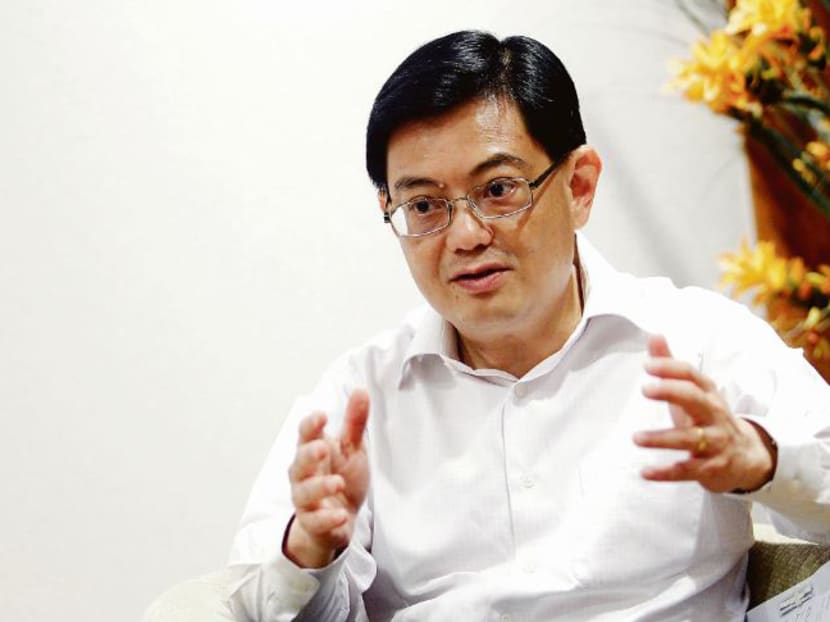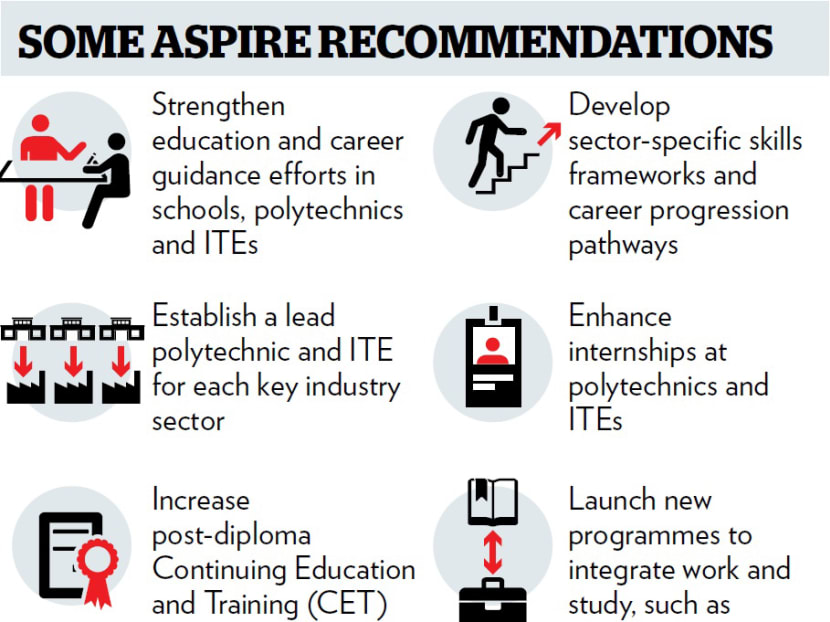Better prospects for poly, ITE grads as S’pore adopts ‘cultural shift’
SINGAPORE — In the next three years, polytechnic and Institute of Technical Education (ITE) students and graduates can look forward to better internships, more opportunities to work and study concurrently, and clearer pathways for career advancement.
SINGAPORE — In the next three years, polytechnic and Institute of Technical Education (ITE) students and graduates can look forward to better internships, more opportunities to work and study concurrently, and clearer pathways for career advancement.
Across secondary schools, junior colleges, polytechnics and ITEs, the Government will provide more resources for education and career guidance, in addition to a new national framework to help Singaporeans make informed education and career choices.
These were among recommendations put up yesterday by the Applied Study in Polytechnics and ITE Review (ASPIRE) Committee yesterday, following the completion of almost nine months of work looking into improving career and academic prospects of polytechnic and ITE graduates.
Accepting all 10 recommendations on behalf of the Government, Education Minister Heng Swee Keat outlined the “significant shifts” underpinning the committee’s proposals.
“We must break the boundary between learning in the classrooms and learning at work. In fact, the workplace should become a great learning place,” he said at a press conference, adding that a renewed and stronger emphasis has to be placed on skills and applied learning, so students can deploy knowledge in the real-world context.
Pointing out how changes in technology and economic structures would cause jobs to be reshaped, Mr Heng said that learning must be continual and lifelong, instead of being “frontloaded” only in the first 20 years of one’s life.
Multiple pathways for development must be encouraged in the course of study and at work, he added. “As a society, we must respect every person and every job, and encourage everyone to achieve excellence in their fields.” Mr Heng acknowledged that it would take many years for individuals, employers, government and society to make these shifts, which would constitute a “major transformation” in Singapore’s education and career landscape.
The ASPIRE committee is headed by Senior Minister of State for Education Indranee Rajah. Its 35-member steering committee includes senior civil servants, the principals of all five polytechnics here, ITE CEO Bruce Poh, as well as corporate leaders such as Hyflux CEO Olivia Lum.
Prime Minister Lee Hsien Loong announced last November the setting up of the committee, which began work in January and has since reached out to about 12,000 polytechnic students, 5,000 ITE students, 3,000 parents and alumni, and almost 400 polytechnic and ITE staff through dialogue sessions and focus group talks, among others. It also visited Germany, Switzerland, Australia and New Zealand to study their applied education models.
Following its visit in February to Germany and Switzerland, the committee saw, among other things, the need for early career guidance to help students discover their interests and understand prospects in the vocational education track. It recommended a new education and career guidance programme to be developed for polytechnics and ITEs, and proposed that more officers trained in this area be deployed in schools, polytechnics and ITEs.
In response, the Ministry of Education said it will have one education and career guidance officer assigned to about five secondary schools and junior colleges for a start. This will be piloted next year with about 40 to 50 schools. Separately, three to five such officers will also be deployed at each polytechnic and ITE college.
To develop expertise in this area, Republic Polytechnic will launch in October a specialist diploma in career counselling. Internship programmes will also be enhanced with longer duration and clearer learning outcomes. To allow more Nitec graduates to deepen their skills before starting work, the ITE will offer an additional 100 Higher Nitec places, starting with Engineering and Infocomm courses next year.
Taking a leaf from the Swiss and German apprenticeship models, place-and-train programmes at polytechnics and ITEs will be piloted in selected sectors from 2016. Under these programmes, to be developed in collaboration with the industry, participants will be paid monthly salaries by their employers as they work towards skills certification such as Specialist or Advanced Diploma awarded by participating polytechnics and diploma by ITEs.
Mr Heng reiterated: “To be trained as a doctor, an engineer or an architect will require certain certification. And in that regard, the degree programme is important and useful.” Even then, these qualifications are only a start, he noted. “It is not a matter of one qualification versus another, but the right and relevant qualifications, and the right and relevant type of learning experiences that enable individuals to build deep skills and expertise and to be able to then excel at the workplace.”
RELATED STORIES
Swiss model of vocational education offers lessons for Singapore: Read more here
Heng calls on companies to do more in workplace training: Read more here
European lessons for Singapore's apprenticeship system: Read more here
Helping students make informed career choices: Read more here








